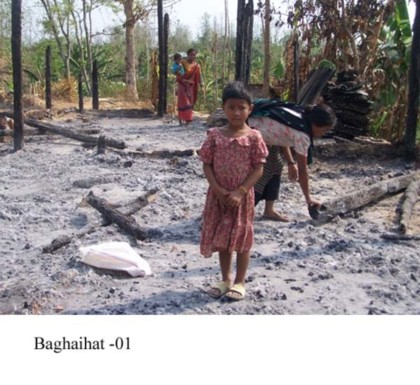| CHT |
| Background |
| Bengali Settlers |
| Armed Resistance |
| Massacres |
| Genocide |
| Religious Persecution |
| Rapes & Abductions |
| Chakma Refugees |
| CHT Treaty |
| Foreign Aid |

|
|
Bangladesh government plans to curb indigenous people's rights
Despite repeated pledges to guarantee ethnic minority rights, the military-controlled interim government has taken a move to curb democratic rights of indigenous communities, according to an official document obtained by New Age.
The home ministry in an instruction, issued recently, asked the authorities concerned to prevent intellectuals and eminent personalities from attending functions organised by ethnic minorities which were mainly aimed at drawing the attention of the authorities to the discrimination and negligence they are being subjected to.
The instructions, which came in line with an intelligence agency report, also included lessening coverage of their programmes both on print and electronic media, and monitoring of the movement of a few ethnic minority leaders, including Joytirindra Bodhipriya Larma alias Santu Larma who had led a bush war in the Chittagong Hill Tracts for about two decades until a peace deal was signed in 1997.
The instructions are being carried out by many government departments, according to sources in the administration.
When contacted for comments, the home secretary, Abdul Karim, said he was not aware of such instructions. 'I have to see if there is something like that,' said the home.
It is learnt that a government agency has reported to the high ups that the ethnic minority people have been engaged in propaganda against the interim government aimed at tarnishing the country's image by holding various programmes.
'Necessary measures should be taken so that the editors, left-leaning politicians and eminent personalities do not participate in the programmes,' says the report, submitted to the offices of the president, chief adviser, home ministry, inspector general of police and Dhaka Metropolitan Police commissioner.
It named the persons and quoted their speeches delivered in the programmes, organised by the indigenous community on the occasion of International Day of the World's Indigenous Peoples on August 8, 2007.
Bangladesh Adivasi Forum and Bangladesh Adivasi Odhikar Andolan organised several discussion meetings which were attended, among others, by indigenous leaders Santu Larma, Rupayan Dewan, Raja Debashis Roy, Promod Mankin, Rabindra Soren and Sanjib Drong, economist Rehman Sobhan, former bureaucrat Dr Akbar Ali Khan, lawyer Dr Kamal Hossain and Sarah Hossain, politicians Manjurul Ahsan Khan, Rashed Khan Menon, Hasanul Haq Inu, former vice-chancellor Emajuddin Ahmed, retired official Amin Ahmed and Professor Badiul Alam Majumder.
Referring to Santu Larma's speech, the report said he had termed the policymakers of the government communal commenting that their [indigenous people] rights could not be established until a non-communal progressive government was formed.
The report said the adivasi organisations and some 'so-called intellectuals' had demanded that the indigenous people's day should be observed officially.
At one such discussion, Hasanul Haq Inu, Manjurual Ahsan Khan and Rabindra Soren delivered speeches which were 'unwarranted,' the report claimed.
'They are also trying to obtain messages from the president and the chief adviser on the occasion [of indigenous day],' it further says, adding that in the name of observing the day, they are engaged in propaganda against the country.
'They may also give confusing statements highlighting human rights violations by the operations of the army and the army-led joint forces,' the report said, urging the government to take necessary steps so that no 'unlawful' activities could take place through such programmes and addresses during the state of emergency.
The home ministry, citing the reports of the intelligence agency, sent a note to the information ministry on October 11, 2007 to take measures to prevent such activities.
Instructions to take necessary steps were also given to Bangladesh Television, Bangladesh Betar and other institutions concerned to that end.